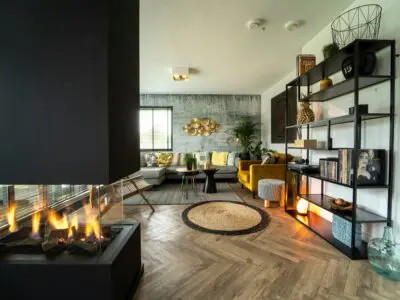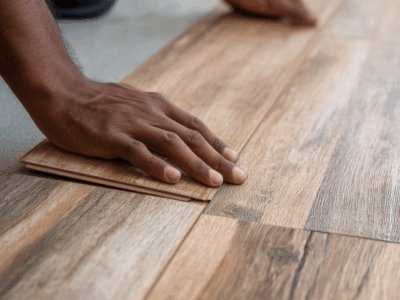The most resilient of all types of flooring has to be real wood. The type of wood you floor your rooms with will have an effect on their life span, so you are best to pick it carefully.
Placing a solid six-seat timber dining table on a floor made of soft wood species, and you’re likely to find the floor planks dented. That can be irreparable damage.
Pine wood floors
Pine is a soft wood available in different varieties. The heart pinewood is perfectly suited to kitchens, as it doesn’t react as intensely to changes in humidity as other types of wood.
Just be wary about the weight of any equipment and furniture placed on it, as it is susceptible to denting. That’s the downside of pine wood floors.
They’re full of character but lack sturdiness.
Hickory and oak wood floors
Hickory wood floors are perfect for creating a homely atmosphere, filled with warmth and cosiness. Solid oak floors will create the same warmly atmosphere in any room.
Mahogany and walnut wood floors
Mahogany and walnut floors are hard wearing with a long life span, and add a grand elegant vibe to the room. They are ideal for offices and formal environments.
Maple and ash wood floors
Maple wood floors are great for large open areas. They create an airy environment ideal for kitchen/dining areas and open plan living areas. Due to the light shade of both woods, they work best with darker and brighter interior décor and not with white or beige walls.
Bamboo floors
Bamboo flooring can be terrific in modern surroundings. However, care must be taken in the manufacturing process, as the bamboo must be matured.
The top veneer will be factory finished and you will need a strong quality topcoat to protect from scratching. For homes with pets, bamboo is not ideal.
Two certification bodies exist to protect sustainability in forestry:
- The Sustainable Forestry Initiative
- The Forest Stewardship Council
Suppliers approved by any of the above two bodies will only use bamboo sustainably, therefore ensuring top quality.
SOLID WOOD OR ENGINEERED WOOD FLOORING
Knowing the atmosphere you want to create in your home is only part of the buying process. Next on the list is the issue of whether you should buy solid wood planks, or opt for an engineered wood floor.
The difference is the quality of wood used. Solid wood floors, manufactured in factories and sold in national chain stores are produced in bulk. They do provide tremendous value and offer a long life span.
With engineered wood floor panels, you get more assurance of quality. The quality of your floor is dependent on the quality of the top veneer.
Any type of wood floor consists of layers
The layers used in the production of the wood floor planks can be of the same wood species, or it can be from different types of wood. The engineering process can give you a stronger wood, as the top veneer is the part that must be the most durable.
Certain types of wooden floor, such as bamboo can be susceptible to scratches. You can increase the resilience of the floor by increasing the strength of the top veneer.
As bamboo is factory finished, ready to install when it arrives, you are limited to adding stains to the top coat. That will give you control over the appearance, but not the thickness of the veneer.
When a scratch occurs on a floor, it is easier to repair the top veneer. When a heavy item of furniture dents the floor, the panel is likely to need replaced.
When flooring with softer woods, such as pine and bamboo where there is likely to be damage, it can be beneficial to have the wood engineered for added strength and durability.
Related News Stories

Why developers choose click lock engineered wood flooring for fast, high-quality installs
Read more
Why Certified Timber Matters in a World Losing Its Rainforests
Read more
5 Big Flooring Trends for 2026
Read more
The Advantages and Disadvantages of Click-Lock Wood Flooring: Is It Right for You?
Read moreJoin our mailing list
Receive the latest news, offers and inspiration straight to your inbox.

